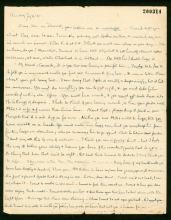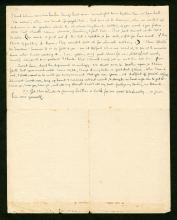BRACERS Record Detail for 19319
To access the original letter, email the Ready Division.
"Thursday" "O My Dear, My Dearest, Your letters are so wonderful—I can't tell you what they are to me."
Letter is not signed.
There are two transcriptions of this letter: document .052416, record 99877; document .201118, record 116328.
They have been condensed, removing references to Miles Malleson, as well as other text. Document ..201118 has been annotated by Colette.
Letter 37
BR TO CONSTANCE MALLESON, 11 JULY 1918
BRACERS 19319. AL. McMaster
Previous Brixton letter, BRACERS 53925; next letter, BRACERS 18680
Edited by K. Blackwell, A. Bone, N. Griffin and S. Turcon
<Brixton Prison>1
Thursday July 11. ’18
O my Dear, my Dearest, your letters2 are so wonderful — I can’t tell you what they are to me. I was shy yesterday with Dickinson there,3 and couldn’t say even as much as usual. When E. is at T.H. I think you might come alone on your days. I see no harm, do you? Meanwhile, I meant to have told Elizabeth to get herself allowed extra visits now, at once, while Whitehead is in Scotland. Do tell her I should love it.
My Heart’s Comrade, it is you that are having a painful time. I ache to be free and to fold you in my arms and make you feel all the warmth of my love. It was a bitter blow about your job being lost.4 I am sorry that I spoke so roughly and despairingly, but it hit me unawares. You must do everything you can to get a job, and you must take film work if nothing else offers. You must have work, and you must not sink down into the lethargy of despair. I hate to think of your losing work, and then your prison with Miles is infinitely worse than mine here. About that: please keep it fixed in your thoughts that it is not to go on for ever. Neither you nor Miles will be happy till you have insisted on a break. You can’t make him happy now, but you may keep him from finding happiness elsewhere; also you encourage him to go against what he believes about freedom. I don’t say all this by way of criticism. I think you are infinitely kind — but I hate the way it takes your vitality and leaves you bare of the essential quality that is you. A thing that does that can’t be right. But don’t think I want to dictate! Only I hate you to suffer — I do, even when I am the cause.a
O my Love, if only I could make you know how deeply and tenderly I love you. All the time in here my love has grown, upward and inward — it is part and parcel of all that is strong in me. Listen, dear Heart — I can’t say it out loud, I can only whisper it. I want to nestle in your arms — I want to feel them round me — I want to hear your dear voice saying tender words — I want to stroke your hair and kiss those eyes that have looked at me with the light of love — those eyes that I have seen shining. O love I want to rest upon your breast — oh I want you.b And I want to be able to make you feel my love, make you know that with you is heaven for me.
I don’t believe ever two human beings had more wonderful times together than we have had. The evening when we read Epipsychidion5 — last time at the Avenue, when we walked up and down in the garden while the shadows lengthened, talking of your work and your future. All that shall come about, Darling, I feel sure. That first sunset at the Cat and Fiddle.6 (Do write and find out if the Cat and Fiddle is for sale, and if so for how much — if they think of pulling it down, they might sell it for almost nothing.) — I love Roads to Freedom7 because it is so full of you — you at Ashford where we read it, and you at the measles time8 when I was writing it. I am getting very good ideas for new philosophical work, really original and important I think. But I shan’t really get on with them till I am free.
Sweet Love, don’t be depressed or unhappy. We shall soon be together again, and I have faith that your work will come right, though it may take a good deal of time. When I come out, I shall want to be with you every moment that you can spare — at Ashford if possible at first. Dearest loved one, keep up heart and courage about work, and struggle as hard as you can to get it. I love you, love you, love you, with all my strength and with all my soul. Goodbye my Darling, my Beloved.
P.S. Get Miss Rinder to give my brother a book for me9 next Wednesday — or give him one yourself.
- 1
[document] The letter was edited from the unsigned original in BR’s hand in the Malleson papers in the Russell Archives. The single sheet was folded twice.
- 2
your letters Colette had written him three letters earlier in July 1918. Her letter of 5 July (BRACERS 113137) was the most personal with memories of their time together. Her letter of 6 July (BRACERS 113138) mainly concerned hunger strikes. Another letter, also written on 6 July (BRACERS 113139), conveyed her impression of visiting him in prison as well as her memory of the time they spent in Ashford. It is not possible to know how many of these letters BR had received by the date of the present letter from him.
- 3
with Dickinson there BR’s old Cambridge friend, Goldsworthy Lowes Dickinson, had accompanied Colette on the previous day’s prison visit.
- 4
your job being lost No correspondence up to this point had mentioned a specific job. In a later letter Colette indicated that an American Colonel, J. Mitchell, whom she met at a luncheon party hosted by her mother at Claridges on 17 July, had told her that an underling of his had done her out of a job (18 July 1918, BRACERS 113143).
- 5
evening when we read Epipsychidion BR read Shelley’s poem Epipsychidion (1821) to Colette the first time they vacationed near Ashford Carbonel in August 1917. In his Autobiography BR recalled that he had read the poem to his first fiancée, Alys Pearsall Smith (1: 83).
- 6
the Cat and Fiddle … for sale The “Cat and Fiddle” pub in Derbyshire where Colette and BR vacationed twice, most recently just before he went into prison. See S. Turcon, “Then and Now: Bertie and Colette’s Escapes to the Peak District and Welsh Borderlands”, Russell 34 (2014): 117–30. In her letter of 5 July 1918 (BRACERS 113137) Colette had written: “Isn’t it awful to think we mayn’t be able to go to the Cat & Fiddle ever again.” She annotated this remark in her “Letters to Bertrand Russell from Constance Malleson, 1916–1969”, p. 243 (typescript in RA). “There was talk of closing or knocking down the Cat and Fiddle. The tenant-landlord was in fact obliged to move out, although Russell tried to help him by writing to the ground-landlord who happened to be Russell’s maternal uncle (Lord Stanley of Alderley).” The Cat & Fiddle did remain standing although Colette and BR never visited it again.
- 7
Roads to Freedom Published in the UK on 1 December 1918; in the US as Proposed Roads to Freedom in March 1919.
- 8
the measles time Colette had the measles in early March 1918.
- 9
give my brother a book for me The occasion for this instruction is unknown.


